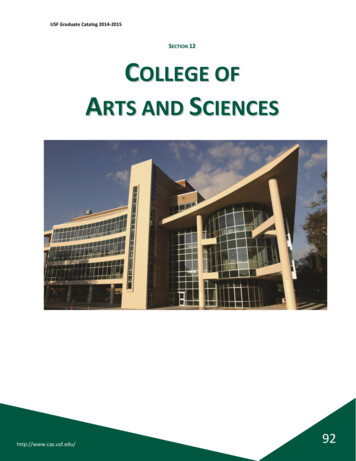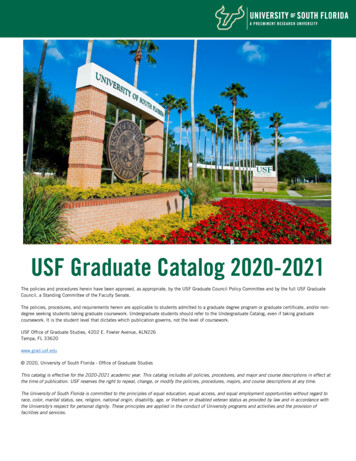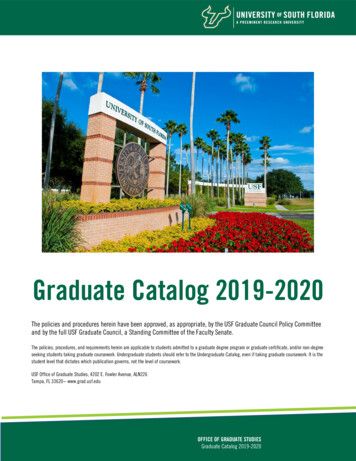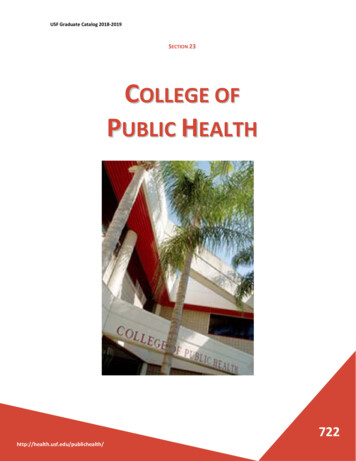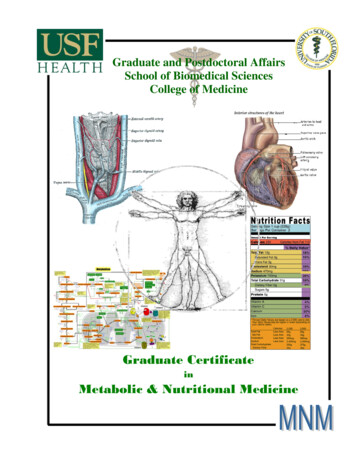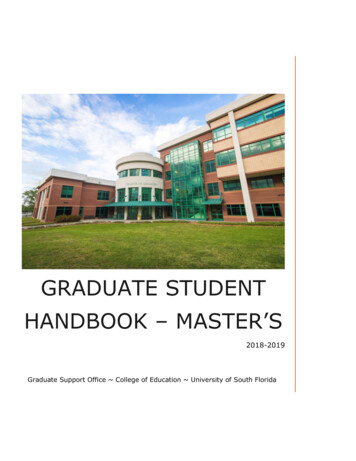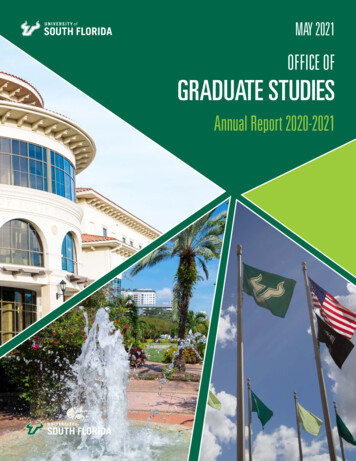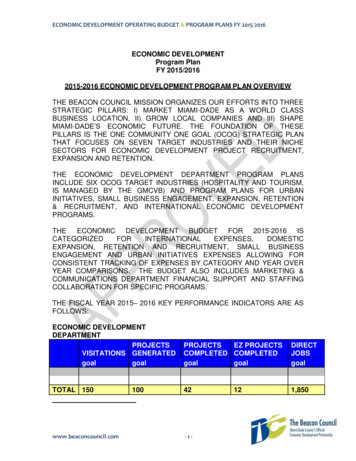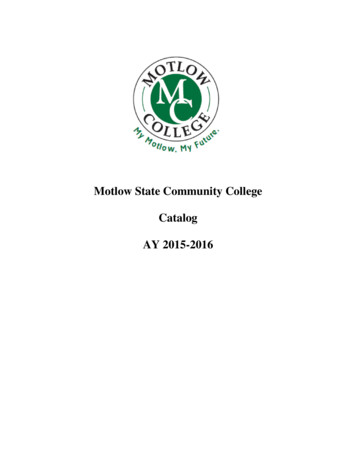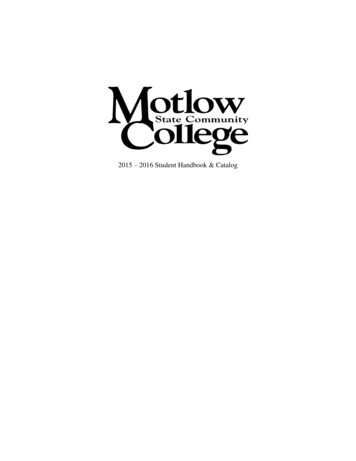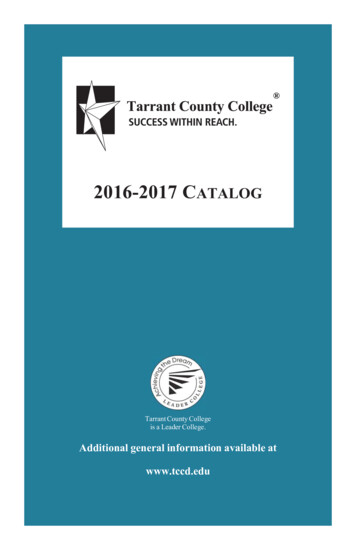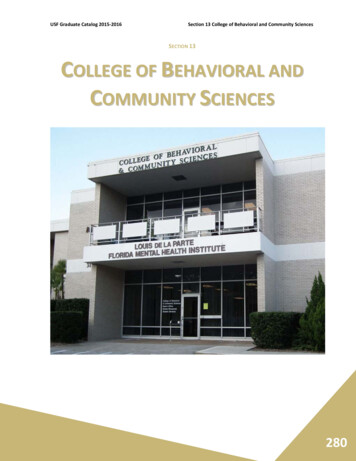
Transcription
USF Graduate Catalog 2015‐2016Section 13 College of Behavioral and Community SciencesSECTION 13COLLEGE OF BEHAVIORAL ANDCOMMUNITY SCIENCES280
USF Graduate Catalog 2015‐2016Section 13 College of Behavioral and Community SciencesChanges to NoteThe following curricular changes for the College of Behavioral and Community Sciences were approved by the USF GraduateCouncil on the date noted. In some instances multiple changes were approved – the most recent date of approval is listed.Administrative ChangeThe Department of Rehabilitation and Mental Health Counseling (RMHC) and joined the Department of Child and Family Studies. Thecorresponding programs under RMHC that are now in CFS include:‐Masters in Rehabilitation & Mental Health Counseling and concentrations: Addictions and Substance Abuse; Marriage and Family Therapy‐Graduate Certificates in Addictions & Substance Abuse Counseling; Integrative Mental Health Care; and Marriage & Family TherapyProgramsAging Studies Ph.D.Applied Behavior Analysis MAApplied Behavior Analysis PhDAudiology Au.D.Audiology Au.D.Criminal Justice Admin. MAGerontology MASocial Work MSWSpeech‐Language Pathology MSSpeech‐Language Pathology MSChange to Regular Admissions, update GRE scoresChange – revise coursesChange Admission Deadline to Dec 5Change – deadline to Jan 15; fall onlyChange ‐require CSDCAS Application in addition to USF AppChange admissions deadline to Aug 1 (Alt Calendar)Change Admission requirements, direct receipt to reg adminChange Admission RequirementsChange deadline to Jan 15Change ‐Require CSDCAS Application in addition to USF AppCertificatesBRIDGEPlace inactiveTranslational Research in Adol. Behav. Health (TRAIN) Change 55/18/151/12/153/9/1511/3/149/8/141/12/15281
USF Graduate Catalog 2015‐2016Section 13 College of Behavioral and Community SciencesUniversity of South FloridaCollege of Behavioral and Community Sciences4202 E Fowler Ave MHC 1110Tampa, FL 33620Web address:Email:Phone:Fax:http://www.bcs.usf.eduSee departmental listings813‐974‐2365813‐974‐4699College Dean:Associate Dean:Associate Dean of Research:Julianne Serovich, Ph.D.Catherine Batsche, Ph.D.Howard GoldsteinAccreditation:Accredited by the Commission on Colleges of the Southern Association of College and Schools (SACS). Contact theCollege for other accreditation information.Mission Statement:The College of Behavioral and Community Sciences prepares students, scholars, human service providers,policy makers, and other professionals to improve the quality of life, health, and safety of diverse populationsand to promote positive change in individuals, groups, communities, organizations and systems. Throughmultidisciplinary teaching and research, service, and engagement with community partners, the Collegefocuses on the rigorous development, dissemination/implementation, and analysis of innovative solutions tothe complex challenges that affect the behavior and well‐being of individuals, families, populations, and thecommunities in which we live.The College offers eight programs at the master’s level and seven programs at the doctoral level. Master’sprograms are available in Applied Behavior Analysis, Audiology (Post‐Baccalaureate), Aural Rehabilitation,Criminal Justice Administration, Criminology, Gerontology, Rehabilitation & Mental Health Counseling, SocialWork, and Speech‐Language Pathology. Doctoral programs are offered in Aging Studies, Audiology,Communication Sciences & Disorders, Criminology, and Social Work. Dual degrees are offered in SocialWork/Public Health at the master’s level and Audiology/Communication Sciences and Disorders at the doctorallevel.The College is also home to the Louis de la Parte Florida Mental Health Institute whose mission is to improvethe lives of individuals with mental, addictive, and developmental disorders. Graduate studies in BehavioralHealth are offered in collaboration with the College of Public Health at both the master’s and doctoral levelsand in collaboration with the College of Education at the doctoral level. The Institute houses a Research Library,a Behavioral Health Research Data Center, and a Survey Research Unit that can support the research thesesand dissertations of graduate students.282
USF Graduate Catalog 2015‐2016Section 13 College of Behavioral and Community SciencesThe following are degree programs offered across programs and/or colleges.Degrees, Programs, and Concentrations:Master of Arts (M.A.)Applied Behavior Analysis (ABY)Criminal Justice Administration (CJA)Criminology (CCJ)Gerontology (GEY)Rehabilitation and Mental Health Counseling (REH)Addictions and Substance Abuse Counseling (ASA)Marriage and Family Therapy (MFL)Master of Science ‐ M.S.Audiology (Post‐Bacc) (AUD)Aural (Re) Habilitation (Post Bac) (ARH)Child and Adolescent Behavioral Health (CAB)Developmental Disabilities (ABDD)Leadership in Child and Adolescent Behavioral Health (ABLC)Translational Research and Evaluation (ABTR)Youth & Behavioral Health (ABYB)Speech‐Language Pathology (Post‐Bacc) (SPP)Master of Social Work ‐ M.S.W.Social Work – (SOK)Doctor of Audiology ‐Au.D.Audiology (AYD)Doctor of Philosophy ‐Ph.D.Applied Behavior Analysis (APB)Aging Studies (AGE)Communication Sciences and Disorders (CSD)Hearing Sciences and Audiology (HAS)Neurocommunicative Sciences (NSC)Speech‐Language Sciences (SLS)Criminology (CCJ)Social Work (SOK) ‐ SUSPENDEDDual Degree Programs:Master of Social Work ‐ M.S.W.Social Work/Public Health Dual Degree MSW/MPH (Maternal and Child Health)(Behavioral Health)Doctor of Audiology ‐Au.D.Audiology/Communication Sciences and Disorders – (AUD/CSD) Dual ProgramDoctor of Philosophy ‐Ph.D.Audiology/Communication Sciences and Disorders (AUD/CSD) – Dual ProgramGraduate Certificates Offered:See Graduate Certificates Section283
USF Graduate Catalog 2015‐2016Section 13 College of Behavioral and Community SciencesInterdisciplinary OpportunitiesThe College of Behavioral and Community Sciences (BCS) works with other colleges in interdisciplinary efforts,such as the jointly offered specialty concentration in Behavioral Health as part of the master’s and doctoralprograms in the Department of Community and Family Health (DCFH) in the College of Public Health (COPH).For information about this, and other opportunities, contact either BCS or COPH for information.COLLEGE REQUIREMENTSThesis EnrollmentUpon successful completion of all M.A./M.S. degree requirements except for thesis, Behavioral & CommunitySciences graduate students must enroll in a minimum of two (2) credit hours of Thesis each semester (exceptSummers) until the completion of the master’s degree.Dissertation EnrollmentDoctoral students who have been admitted to candidacy, are required to accumulate a minimum of six (6)credit hours of Dissertation during each previous 12‐month period (previous three 3 terms, e.g., Fall, Spring,Summer) until the degree is granted.284
USF Graduate Catalog 2015‐2016Section 13 College of Behavioral and Community SciencesAbout the CatalogThe University of South Florida Graduate Catalog is organized with the degree programs offered listed in thesection of the College that offers them. For example, the Master of Science degree with a “program” (alsoknown as major) in Biology is listed in the College of Arts and Sciences section. Some colleges offer areas ofspecialization, or “concentrations” within a degree program.PROGRAMSAGING STUDIES PROGRAMGreen denotesProgram (or Major)Doctor of Philosophy (Ph.D.) DegreeBlack denotes degreeDEGREE INFORMATIONCONCENTRATIONSConcentration Requirements are listed separately under each Program.The Program and Concentration are listed on the official transcript. Other areas, such as application tracks, arenot listed on the transcript.Example:Doctor of Philosophy in Communication Sciences and Disorderswith a Concentration in Speech‐Language Sciences285
USF Graduate Catalog 2015‐2016Aging Studies (Ph.D.)AGING STUDIES PROGRAMDoctor of Philosophy (Ph.D.) DegreeDEGREE INFORMATIONCONTACT INFORMATIONProgram Admission Deadlines:Fall:January 15Fall admissions onlyCollege:Behavioral & Community SciencesDepartment: School of Aging Studies (GEY)Contact Information:Minimum Total Hours:Program Level:CIP Code:Dept Code:Program l30.1101GEYAGE BC1994PROGRAM INFORMATIONThe Interdisciplinary Ph.D. in Aging Studies is the first of its kind in the United States, and to the best of our knowledge, theworld. What makes this program unique is the combined emphasis on providing a broad based foundation in theinterdisciplinary aspects of aging with a focus on developing in‐depth expertise in a research area. The program draws onthe expertise of faculty from multiple colleges, departments, and centers at the University of South Florida to providestudents with exposure to other disciplines and their different approaches to scientific and scholarly inquiry.The Ph.D. in Aging Studies is hosted by the School of Aging Studies, which is the organizational focal point forinterdisciplinary research, educational, clinical and community service activities in aging for faculty and students. Aninterdisciplinary committee of faculty governs the program, allowing students to develop research programs that focus ontheir particular interests and capitalize on the breadth of opportunities throughout the university.The Ph.D. in Aging Studies is a research‐oriented program designed to train future leaders in the field of aging. The programadmits students who show exceptional promise to become strong academic, public sector, and corporate researchers.Students should expect to enroll in the program full time (9 credits in fall, 9 credits in spring, and 6 credits in summer). Firstyear students are generally supported with an 18,000 fellowship, tuition waiver, and health insurance. Fellowship orassistantship support and tuition waivers are generally available during subsequent years of doctoral training. Studentswho wish to apply as part‐time students must contact Dr. McEvoy before applying.Faculty OrganizationThe interdisciplinary nature of the program is exemplified by the number of core faculty who teach and serve ondissertation committees in the program and the range of academic departments they represent. Over forty faculty frommultiple colleges and research centers have been identified as the core faculty in the program.Accreditation:Accredited by the Commission on Colleges of the Southern Association of College and Schools.286
USF Graduate Catalog 2015‐2016Aging Studies (Ph.D.)ADMISSION INFORMATIONMust meet University requirements (see Graduate Admissions) as well as requirements listed below.Program Admission Requirements A Bachelor’s DegreeGPA of 3.25 anda current GRE; to be competitive, 160V (above the 50th percentile), 149Q (above the 30th percentile), 4.5 (abovethe 50th percentile) A.W.Applicants where English is not the language of instruction must also submit a TOEFL iBT score of at least 79which corresponds to a score of 600 on the old TOEFL Test.In addition, students must submit their best example of a single authored writing sampleand a summary of their career goals and past preparation for a research career plusthree letters of recommendation from individuals familiar with the student’s work and/or research.DEGREE PROGRAM REQUIREMENTSMinimum Hours ‐ 90 credit hours beyond the baccalaureateCore Requirements – 34 credit hoursDir. Research/Dissertation‐ 56 credit hoursCORE REQUIREMENTS – 34 credit hoursCourses ‐12 hoursGEY 76103GEY 76043GEY 76493GET 76233Psychological Aging: Interdisciplinary PerspectivesBiomedical AgingPopulation AgingSocial and Health Aspects of AgingEach core course is taught from an interdisciplinary perspective with faculty from different fields addressing issues fromtheir disciplinary perspectives.Methods Courses ‐ 6 hours minimumGEY 64023 Statistical & Qualitative Methods in Aging ResearchGEY 64033 Multivariate Statistical Analysis for Aging ResearchStudents must also enroll in a sequence of at least two methods/statistics courses and are encouraged to obtain additionaltraining in methods relevant to their dissertation.Proseminar and Content Seminar ‐ 16 credits minimumGEY 79364 Aging Studies Pro‐seminarGEY 76023 Ph.D. Seminar in Health and AgingGEY 76113 Ph.D. Seminar in Mental HealthGEY 76223 Ph.D. Seminar in Policy and ElderlyGEY 76513 Ph.D. Seminar in CognitionStudents are required to enroll in the GEY 7936 Aging Studies Pro‐seminar (2 credits) each fall of their first 2 years in theprogram. They must also enroll for at least four Content Seminars (GEY 7602, GEY 7611, GEY 7622, GEY7651) (3 credits).The Pro‐seminars investigate different research topics, allow students to practice presenting their research, and providestudents with exposure to distinguished lecturers from throughout the U.S. The content seminars cover different topicsrelevant to aging each spring semester.Elective RequirementThere are no requirements, other than the total minimum credit hours mentioned above. Each Ph.D. student, inconsultation with his/her major advisor, designs an appropriate curriculum to obtain content and skills that match theirresearch interests.287
USF Graduate Catalog 2015‐2016Aging Studies (Ph.D.)Project – 1 credit hourGEY 79111 Directed Research in Aging StudiesAll students complete a First Year Research Project, designed to be presented at a national conference in the fall of theirsecond year. Students develop individualized courses of study, allowing specialization in a wide variety of content areasand research methods. Supervised research experience is available from a number of faculty with diverse researchexpertise. Students enroll for GEY 7911 (Directed Research in Aging Studies) for 1 credit hour for a grade of S/U.Comprehensive/Qualifying examThe qualifying examination is usually taken during the end of the second year of course work, or the following Fallsemester.Dissertation ‐ 56 hours minimumAt least two (2) credits of Dissertation every semester after admission to candidacy; if more than minimum of requiredcourse credit is taken, then fewer credits of Directed Research are required.GEY 7911GEY 79801‐192‐12Directed ResearchDissertationCOURSESSee http://www.ugs.usf.edu/course‐inventory/288
USF Graduate Catalog 2015‐2016Applied Behavior Analysis (M.A.)APPLIED BEHAVIOR ANALYSIS PROGRAMMaster of Arts (M.A.) DegreeDEGREE INFORMATIONCONTACT INFORMATIONProgram Admission Deadlines:Fall:February 15College:Minimum Total Hours:Program Level:CIP Code:Dept Code:Program (Major/College):Approved:44Masters42.9999CFSABY BC2000Department:Behavioral & CommunitySciencesChild and Family Studies (CFS)Contact Information:www.grad.usf.eduPROGRAM INFORMATIONThe master's degree program in applied behavior analysis (ABA) is designed to meet growing needs in Florida and nationallyfor practitioners who can work effectively in the fields of developmental disabilities, autism, education, child protectiveservices, child behavior disorders, rehabilitation, mental health, and business and technology. ABA provides an approach fordeveloping, implementing, and evaluating practical strategies to produce changes in socially significant behaviors ofindividuals in the context of community settings. Three important features characterize the scientific basis upon which ABAis built: a) it focuses upon objectively measurable behavior of individuals; b) it studies environmental influences upon thetargeted behaviors; and c) it places a premium upon single‐subject research designs to analyze the effects of differentenvironmental variables.The 44‐credit‐hour master's degree in ABA is in the department of Child and Family Studies in the College of Behavioral andCommunity Sciences. Students demonstrate knowledge of behavioral principles and procedures in courses that constitute acore curriculum, demonstrate applied behavior analysis skills through supervised practicum experiences, and complete adata based thesis. The master's degree program is designed to prepare students to meet the standards to be BoardCertified Behavior Analysts (BCBAs). It will prepare them for employment in a variety of fields where there are growingdemands for competent professionals with expertise in applied behavior analysis.PhilosophyThe systematic analysis and application of behavioral principles is an extensive repertoire of professional behaviors. In theUSF ABA program, these skills are acquired as students move through the sequenced curriculum of coursework andpracticum experiences. The curriculum requires application of behavior analytic principles, with direct supervision byfaculty and BCBA supervisors. Students participate in practicum training in community agencies under the supervision ofBCBAs. In addition to the 10‐25 hours of behavior analysis practice they complete in their practicum sites each week,students also participate in practicum seminars each semester. In these seminars, the Practicum Coordinator discussesimportant practice issues and facilitates student discussion of their applied work. The supervision of the students’ researchtheses rests in the hands of designated core faculty members (i.e., “major professors”). Major Professors serve as mentorsfor the students by closely supervising their research and their progress through the program. Therefore, as students arementored by their major professors during the program, a meaningful major professor‐student relationship is essential.Accreditation:Accredited by the Commission on Colleges of the Southern Association of College and Schools.289
USF Graduate Catalog 2015‐2016Applied Behavior Analysis (M.A.)ADMISSION INFORMATIONMust meet University requirements (see Graduate Admissions) as well as requirements listed below.Program Admission Requirements Three letters of reference from professors and/or employers who know the applicant well Current resume or curriculum vitae One‐page narrative describing the applicant’s experiences, training, and interest in Applied Behavior Analysis andin the Master's Program in Applied Behavior Analysis at USF. GRE Scores on the general subtestsSpecific ProceduresThe primary assumption underlying admission to the M.A. program is that every student accepted is capable (a) ofsuccessfully completing his or her respective program and (b) of performing competently in the field as an Applied BehaviorAnalyst. Applicants are selected based on their potential to benefit from the program and their potential to contribute bothto the Program and the field of Applied Behavior Analysis.Within the admissions process, a culturally diverse student body is actively recruited, and applicants of academic andprofessional promise are not systematically excluded on the basis of race, ethnic origin, gender, age, religion, lifestyle,sexual orientation, or physical handicap. The admissions process is selective, but flexible‐‐all pertinent data submitted forconsideration will be evaluated as an entire package. The evaluation process, however, does involve both academic andinterpersonal considerations. The profession of Applied Behavior Analysis requires that the practitioner possess personalcharacteristics as well as academic and technical competencies, and the admissions process attempts to evaluate boththese areas.Admission to the program is based on past academic work; coursework in ABA, a CV outlining relevant work, volunteer, andextracurricular experience in applied behavior analysis; letters of recommendation; and a statement of ABA interests, andprofessional goals. Students may apply, after conferral or anticipated conferral of their Bachelor's degree. Applicationsshould be submitted by February 15 to be considered for application in the following fall term. Late applications will beconsidered if space in the program is available.For further Admissions Information, please visit Graduate Admissions.A decision about each
Social Work MSW Change Admission Requirements 1/12/15 Speech‐Language Pathology MS Change deadline to Jan 15 3/9/15 Speech‐Language Pathology MS Change ‐Require CSDCAS Ap
